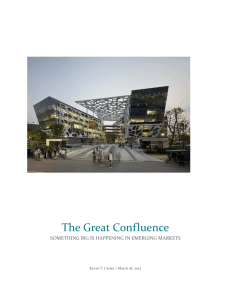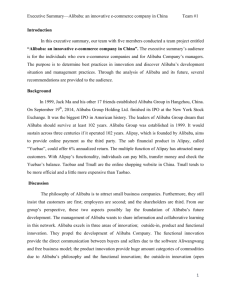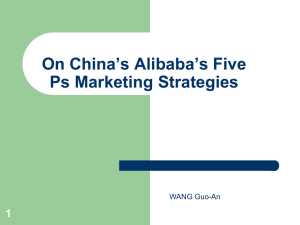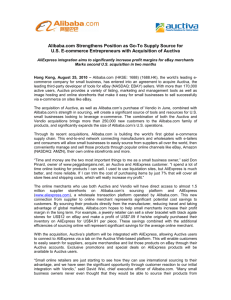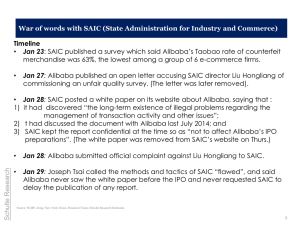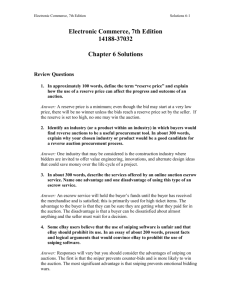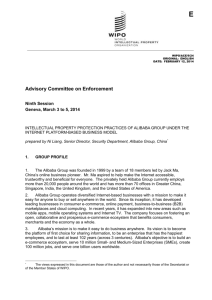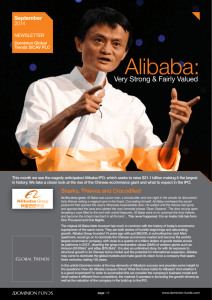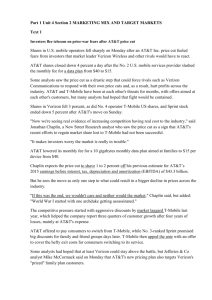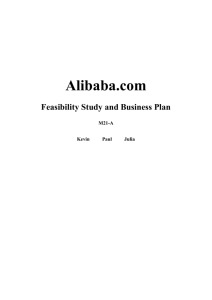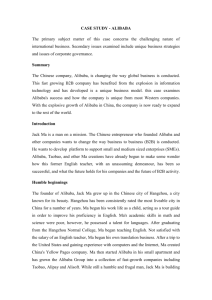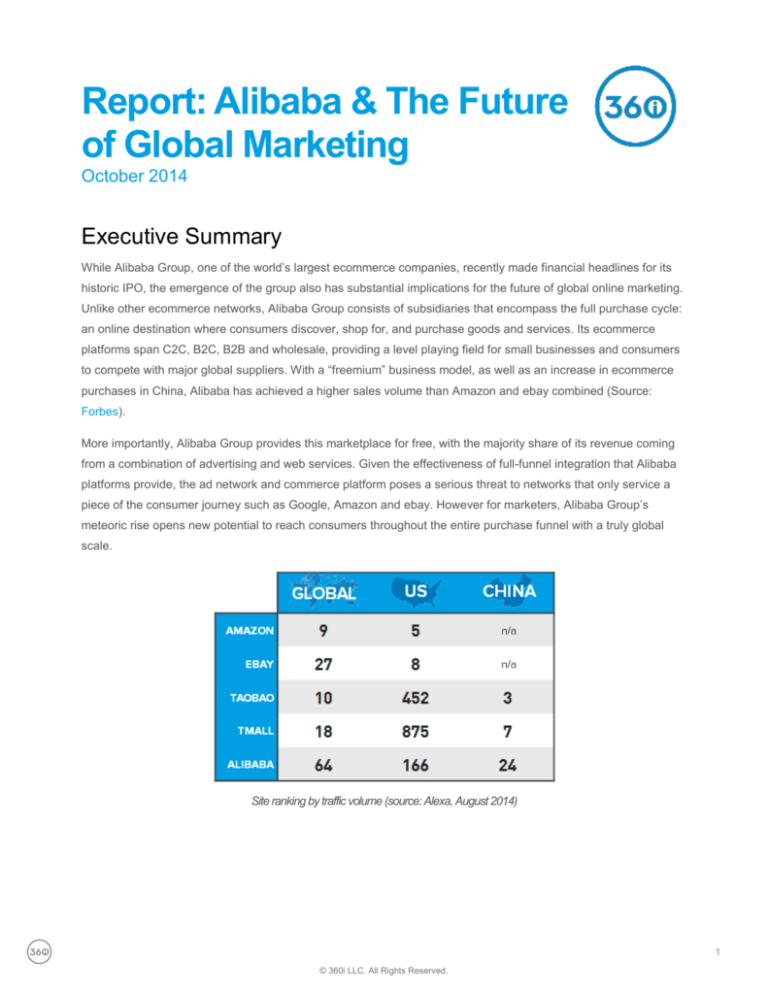
Report: Alibaba & The Future
of Global Marketing
October 2014
Executive Summary
While Alibaba Group, one of the world’s largest ecommerce companies, recently made financial headlines for its
historic IPO, the emergence of the group also has substantial implications for the future of global online marketing.
Unlike other ecommerce networks, Alibaba Group consists of subsidiaries that encompass the full purchase cycle:
an online destination where consumers discover, shop for, and purchase goods and services. Its ecommerce
platforms span C2C, B2C, B2B and wholesale, providing a level playing field for small businesses and consumers
to compete with major global suppliers. With a “freemium” business model, as well as an increase in ecommerce
purchases in China, Alibaba has achieved a higher sales volume than Amazon and ebay combined (Source:
Forbes).
More importantly, Alibaba Group provides this marketplace for free, with the majority share of its revenue coming
from a combination of advertising and web services. Given the effectiveness of full-funnel integration that Alibaba
platforms provide, the ad network and commerce platform poses a serious threat to networks that only service a
piece of the consumer journey such as Google, Amazon and ebay. However for marketers, Alibaba Group’s
meteoric rise opens new potential to reach consumers throughout the entire purchase funnel with a truly global
scale.
Site ranking by traffic volume (source: Alexa, August 2014)
1
© 360i LLC. All Rights Reserved.
How Alibaba Works
Out of Alibaba Group’s many holdings, Taobao (A C2C business model similar to Ebay and Craigslist), Tmall (A
B2C model similar to Amazon) and Alibaba (A B2B wholesale-like business model) are the three main
marketplaces -- and all rank among the most visited sites in both China and the world. While businesses are
allowed to list their products for free on the platform, Alibaba Group provides a range of advertising and web
hosting services that help build exposure and provide legitimacy to acquire potential new customers. Advertisers
also have access to advanced targeting features using Alibaba Group’s own data management platform (DMP),
Alimama. Other subsidiaries such as Alipay (similar to PayPal) and Cainiao (a logistics platform) serve to ensure
secure payment and delivery of goods, creating a desirable and legitimate marketplace for buyers and sellers
alike. Despite these efforts, counterfeit listings and fraudulent buyers still remain a challenge for the ecommerce
giant.
Alibaba Properties matched to platforms & US equivalents (source: 360i Insights, August 2014)
Moreover, Alibaba Group has made efforts to control the full path-to-purchase by blocking major search sites,
notably Baidu. As a result, consumer behavior in China has effectively shifted to circumvent third party search sites
when shopping online. This is especially valuable to marketers, as Alibaba sites have become a singular force in
consumer discovery, consideration and purchase. In theory this would also create efficiencies for search and
display advertisements, with multiple touchpoints on one platform.
Percent web traffic to site by search referrals (source: Alexa, August 2014)
2
A Growing Impact
Currently China is Alibaba’s primary market, although its global consumer base is rapidly expanding. Alibaba
Group has already made moves for expansion into Russia, Brazil and North America with AliExpress, which allows
consumers to buy direct from Chinese suppliers. The ecommerce giant has also begun the slow rollout of a
design-centric local marketplace site similar to Etsy called 11main. Alibaba properties in the USA are currently
seeing significant traffic with approximately 10 million site visits per month – close to other major online retailers
such as Best Buy (16 million site visits per month) (Source: comScore).
Demographic breakdown of Alibaba properties* users compared to general population (source: comScore USA, August 2014)
Alibaba Group has worked with small and large businesses alike, including companies from the USA. Alibaba’s
founder Jack Ma has repeatedly stressed his commitment to empowering small businesses, helping to connect
merchants to new customers in China and the rest of the world. Additionally, multinational brands have already
taken advantage of ad inventory on Alibaba Group’s Taobao Affiliate Network. Linking full-funnel consumer data
with mobile (Alibaba offers a mobile OS business called Aliyun) has allowed brands to leverage integrated ad
targeting and insights. One notable example comes from Alibaba Group’s work with Mercedes Benz, which the
company outlined in its SEC filing:
"By matching data collected from visitors to their physical showrooms to our DMP, we were able to
identify the showroom visitors who also visited our China retail marketplaces and our partner websites
and to add additional attributes to the data set using our proprietary algorithm. We then ran an online
marketing program on behalf of Mercedes Benz to deliver targeted advertisements to a much larger set
of potential customers with similar attributes without disclosing personally identifiable
information. Mercedes Benz reported to us a noticeable increase in foot traffic following launch of the
campaign." (Source: AdExchanger)
While Alibaba sites have demonstrated huge potential for global success, their greatest achievement has been
unlocking markets that are relatively new to ecommerce. Consumers are more likely to transact on a platform that
they deem legitimate, and Alibaba Group has worked with its partners to effectively erode skepticism and to build
trust. The results speak for themselves.
3
Marketer Implications
The Alibaba Group is competing in all spaces of Internet commerce with ad networks, ecommerce, and
payment/logistics companies all facing a potential impact. Nonetheless, how Alibaba uses its global scale and
reach has yet to be seen, as market penetration outside of China is still developing. This creates an opportunity
rather than a threat, as Alibaba Group’s services have lowered the barrier to entry to new markets, especially in
China. For marketers, there are three major implications to consider:
An opportunity to reach new markets – Alibaba sites have worked incredibly well at meeting the needs
of consumers in developing markets, and the network provides an opportunity to reach customers in
China, and increasingly Russia and Brazil.
Staying ahead of competitors – Alibaba Group’s ad network provides marketers the opportunity to reach
consumers across all purchase stages. Brands should consider how they might be able to work with the
ecommerce giant to explore first-to-market opportunities.
Advanced targeting and consumer insights – With access to full-funnel consumer data, Alibaba and its
affiliate brands have the opportunity to leverage unparalleled insight into path-to-purchase attribution
modeling. With access to robust, global data, this presents the potential to change how companies spend
and measure success in online advertising.
Conclusion
The Alibaba Group IPO signals great opportunity not only for investors, but also for marketers with an eye for
global expansion. For now, the Alibaba network provides a chance for marketers to access new markets in China
and beyond. In the future, the commerce network has even greater potential to reshape online advertising as we
know it, and to unlock a wealth of consumer insight.
About 360i
360i is an award-winning agency that drives results for Fortune 500 marketers by making brands culturally relevant
amid the rapid pace of consumer behavior change. 360i is a highly strategic creative and media partner for clients
that brings together digital specialization – in insights, strategy, social, influencer marketing, search, analytics and
media – with a deep understanding of how people discover brands and share stories across all channels. This
year 360i was consecutively named the top digital agency according to Advertising Age, Adweek and MediaPost,
in addition to being recognized among the industry’s most innovative companies by Fast Company and Creativity.
The agency’s clients include Coca-Cola, Kraft, Mondelez, Toyota and HBO. For more information,
visit blog.360i.com or follow us on Twitter @360i.
Report by Andy Rooks, Senior Analyst, Insights & Planning at 360i. Claire Charron, Manager, Global Insights &
Planning at 360i contributed to this report.
4
Ways to Connect With 360i
360i.com/reports
blog.360i.com
twitter.com/360i
editor@360i.com
5


